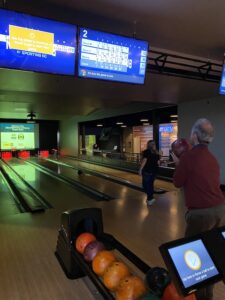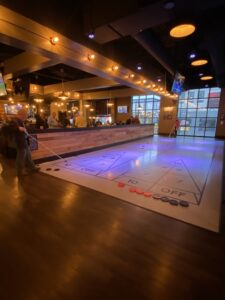SWANA held its first SOAR Technical Conference this week in Kansas City, MO and everyone was happy to get out and learn, network and have a good time at the event. Kicking off Tuesday, March 21 with guided tours to the HAMM Material Recovery Facility in Lawrence, KS and the Boulevard Brewery, SWANA committees also held their meetings to discuss issues in the areas of landfills, safety, waste conversion and communication. At the end of the day, a networking party was held where attendees could re-connect and enjoy light conversation before getting ready for the first day of exhibits and conferences.
On Tuesday, Brenda Haney, gave opening remarks on her love for the industry and stated that the men and woman involved are the everyday heroes. She also recognized the chapter officers whose tireless efforts throughout the year help SWANA remain timely and a leader in the industry. Michael Shaw, the Public Works Director for Kansas City, MO also greeted attendees with a welcome to the city and encouraged them to check out some of the things around town that the city is known for, such as jazz and BBQ.
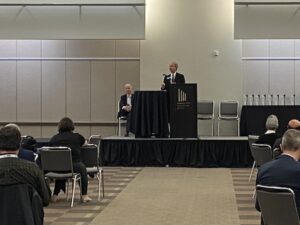
SWANA Overview
Up next was David Biderman, CEO and Executive Director of SWANA who provided an overview of what SWANA has been focused on and where the association was going. He stated that they were fortunate that membership levels stayed strong at 11,000 members. SWANA is focused on growing and nurturing the next generation and the next layer of leadership, so the organization is providing resources to them in order to grow in their positions. The first YP Leadership Academy was held in Maryland, where the young professionals trained and learned from each other. Biderman stressed that SWANA was guided by its strategic plan that the board passed in 2015 and had been responsible for the great success and growth that the association has seen over the past several years. “We are planning on approving a new one in the near future. Our core purpose and mission about resource management is not going to change. However, the goals will be to get us off list of 10 most dangerous jobs, become climate champions, reframe the industry as employers of choice, strengthen SWANA’s infrastructure and financial viability, diversity, equity and inclusion, giving everyone the opportunity to serve on committee, board, etc. and foster association that looks like the industry that we are proud to represent,” said Biderman. He went on to explain that education is a core part of what SWANA is all about. They will continue to be the industry leader in training and certification with an updated MOLO program (a key training program for those who work in landfills), and they are in the process of updating the Canadian version of MOLO as well. With regards to recycling, SWANA is at the center of the policy conversations in Washington, DC. The EPA issued a national recycling strategy late last year and SWANA will be participating in implementing the initiative. In addition, the industry was lucky enough to get money in the infrastructure bill through grant funding for recycling. SWANA is also at the center of EPA’s strategic plan for PFAS as well. “We are having conversations about PFAS and landfills being passive receivers of garbage. We didn’t make the PFAS; we are managing the problem and trying to protect public health and the environment. It is a long game, it will happen over multiple federal statutes,” Biderman explained. In addition, SWANA has established themselves as Subject Matter Experts in a wide variety of industry issues in the media. They have seen more stories about the industry and have been quoted on CNN, CNBC, NPR, AP, and others. Finally Biderman thanked, the attendees, sponsors, partners, and especially SWANA staff for putting on a great event.
SWANA Awards
Next, Tim Flanagan, SWANA’s Vice President, took the stage to announce SWANA’s 2022 Technical Division Winners. He said he has been in industry 40 years and is very grateful that they all make a difference. He stressed that the attendees also make a difference by bringing information they see and learn back to the chapters, informing others as well. The winners included: Sustainable Material Management Technical Division, 2022 Distinguished Achievement Aaward – Risa Weinberger, President of Risa Weinberger Associates; CEM Distinguished Individual Award – Ramona Simpson; Facility Excellence Award – NexProcess (Atlanta). In the Landfill Gas and Biogas Technical Division, Eternal Flame Awards were given to Bill Lee, Lee Supply; Bob Schoenberger, Chester County Solid Waste Authority, Scott Fowler – Waste Connections; Rod Weitkamp, Republic Services; Ray Nardelli, LFG Specialties; Vince Little – Environmental Group; Flanagan stressed the Eternal Flame Awards were Legacy Awards and everyone needed to remember them and thank them for their dedication and service.
Keynote Presentation
Finally, Keynote Speaker, Michael Hoffman from Stifel talked about the current state of the solid waste industry in the stock market, where the industry stands currently with regards to supply chain issues, labor, PFAS and even moving to a circular economy. He said we are at an unusual time; right now, we are seeing hyper-inflation, living through a pandemic, seeing 1930s geopolitical expansionism, and dealing with an energy crisis. Can the industry raise prices in real time to offset inflation? The market focuses on valuation frameworks. Solid waste businesses are run better today than 20 years ago; as an industry, this has translated to better cash conversion. This industry is generating more free cash as a business model to go into general fund. Where are we now? The best part of the garbage busines is the commercial collection market. Put enough new houses in you are going to need more business fronts, business licenses, applications, more disposable income. While savings spiked during shutdowns, above average savings has been spent and we are back to a “normal” rate. Now, we are at better pricing, better volume, consistent business. Markets have come back into the garbage industry in the last few weeks. M&A is still above average—last year was the best ever, and it is still on an active pace in 2022.
He went on to talk about how Russia exports 5 million barrels of oil per day of heavy crude. If it does get banned, then prices for oil a barrel go way up around $200 per barrel. In addition, 33% of steel comes out of Russia (10% of world’s steel). If you cut that off, it will hit not only everything but food prices as well and throw undeveloped countries into disarray. With regards to the labor force, 4 to 8 million people are out of the work force permanently. They either decided they could live on one income or were 55+ and finished their first career with enough money saved. He stressed if we don’t figure out immigration reform, we will not figure out labor force. He also pointed out that 52% of population are women and many of the trucks ae not designed for a person 5’4” and under; as a result, we need to think about truck re-design.
He covered MRF challenges, and the fact that they are mostly built for a different waste stream composition. The industry will need a $3 billion to $5 billion recapitalization. The next big move is organics. As a result of the infrastructure bill being signed into law in November 2021, there are a lot of good things in there for industry and the bigger spending will be in 2023 when the money starts to flow and there will be real commitments to projects.
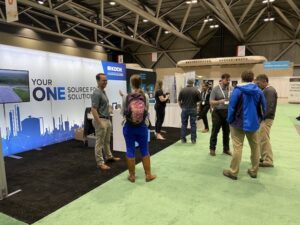
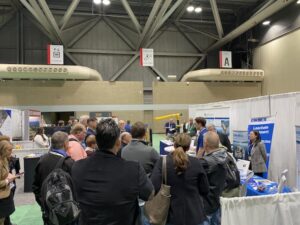
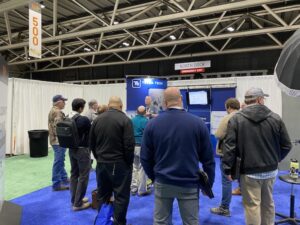
Exhibits and Catalyst Sessions
Both Tuesday and Wednesday featured an exhibit show floor filled with technologies for the industry—from fleet management to biogas, RNG and PFAS, attendees were able to walk the trade show floor and see the many solutions available. Lunch on the show floor brought everyone together and gave people a chance to kick back and enjoy BBQ and good conversation, throwing out ideas and experiences in order to learn from each other and what they do in their respective areas. Catalyst sessions throughout the exhibit time on the show floor drew attendees to specific booths to learn about certain companies’ products and best practices, such as “Reverse Osmosis to Remove PFAS from Landfills” (Rochem), “Equipment Review and Startup/Changeout Process” (Interra Global), and more. Topping off the first day of exhibits, a reception was held on the show floor.
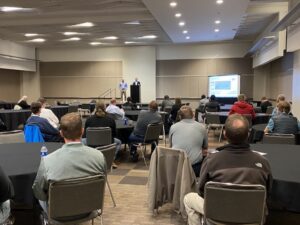
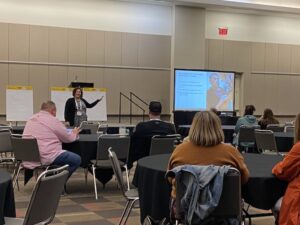
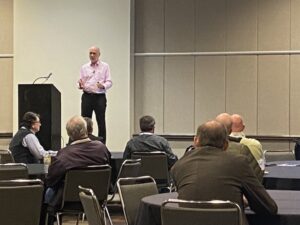
Technical Conference
Along with the exhibits and Catalyst Sessions, the technical conference of SOAR offered great discussions throughout Tuesday, Wednesday and Thursday morning. Busy conference rooms provided lively talks on plus a variety of topics, including EPA’s National Recycling Strategy, Solid Waste Contracting Challenges, Conversion of Biogas Power to Renewable Natural Gas, Navigating the Environmental Justice Process, Organics Diversion in California, Reducing Contamination in Drop-Off Programs, Remote Controlled Technologies at the Landfill, as well as PFAS-focused seminars.
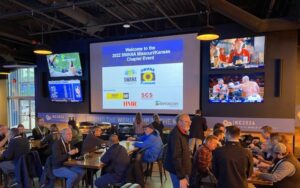

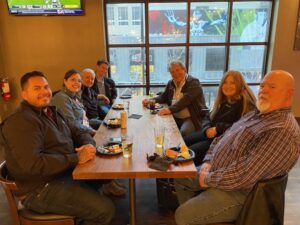
SOAR Networking Party
The networking party on Wednesday was held at No Other Pub in the Power and Light District, where attendees, vendors and sponsors were able to unwind after the second day of conferences and wrapping up the exhibits on the show floor. Guests enjoyed good food and a variety of games inside the pub that included foosball, ping pong, shuffleboard, darts, ping pong, golf and bowling.
SWANA SOAR has come roaring back from the effects of the pandemic and put on a great event. We look forward to the next one in Atlanta, GA in April 2023. Also, be sure to put WASTECON on your calendar later this year from December 5 – 8 in San Diego, CA.
